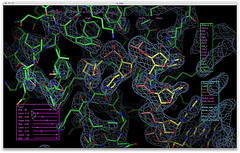 p53 (TP53), a transcription factor activated by various types of cellular stress, is one of the most well studied tumor suppressor proteins. Stress signals such as various types of DNA damage lead to p53 activation and subsequent induction of genes involved in cell cycle arrest, DNA repair, and apoptosis.
p53 (TP53), a transcription factor activated by various types of cellular stress, is one of the most well studied tumor suppressor proteins. Stress signals such as various types of DNA damage lead to p53 activation and subsequent induction of genes involved in cell cycle arrest, DNA repair, and apoptosis.
In many types of cancers including colorectal cancer, loss of function mutations in p53 commonly occur, particularly in the DNA-binding domain. Thus, transcriptional activity of p53 is altered or lost, and cells with damaged genomes maintain viability. In colorectal cancer, p53 mutations commonly occur at early stages and are thought to allow for accumulation of DNA damage and survival of mutated cells during tumorigenesis.
In the January issue of Cancer Cell, Schwitalla et. al, demonstrate that p53 plays a role in not only its classically associated functions as a critical DNA-damage checkpoint in early stages of tumorigenesis, but during the progression stage, p53 plays an additional significant role in regulating the inflammatory tumor microenvironment.
To study the role of p53 during various stages of carcinogenesis, the authors established a colon tumor model in which azoxymethane (AOM), a promoter of Wnt-driven tumorigenesis that induces stabilizing mutations in β-catenin, was administered to mice with a p53-deficiency in intestinal epithelial cells. A gene expression analysis of AOM-derived tumors from wild-type versus p53-deficient mice, found that p53 deficiency led to upregulation of genes involved in inflammation and epithelial-mesenchymal transition (EMT). A large number of genes upregulated in p53-deficient tumors were found to be regulated by the inflammatory transcription factor NF-ĸB, and phosphorylated p65, a major transcriptional co-factor in the classical NF-ĸB pathway, was enhanced in p53-deficient tumors. NF-ĸB regulated genes included the EMT gene Twist as well as myeloid cell chemokines CXCL1, CXCL2, and CCL2, indicating that loss of p53 may lead to EMT and recruitment of inflammatory myeloid cells via upregulation of the NF-ĸB pathway.
Reciprocal regulation of the NF-ĸB and p53 pathways has long been known, and these pathways play opposing roles in cell fate in response to stress. However, in this study, the authors demonstrated that p53-deficient intestinal epithelial cells were impaired in their epithelial barrier function: leakage of intestinal bacteria and LPS resulted in the observed NF-ĸB activation and NF-ĸB-regulated gene expression. Interestingly, NF-ĸB signaling was required in both tumor cells and the myeloid cells for maximal tumor progression. NF-ĸB signaling in intestinal epithelial cells was required for recruitment of myeloid cells to the tumor microenvironment and EMT induction. NF-ĸB signaling in hematopoietic cells was required for tumor cell proliferation, survival, and metastasis, by inducing expression of cytokines that activate STAT3 in the tumor cells.
Thus, in this model, p53 plays an additional role during tumor progression by regulating inflammation in the tumor microenvironment, via its effects on intestinal barrier function. In my last blog post, I discussed another recent study demonstrating links between the TNFα/NF-ĸB, IL-6/STAT3, and SphK1/S1P pathways in chronic inflammation driven colorectal cancer. Thus, this study adds another layer of links to consider in the complicated interactions between inflammatory cells and tumor cells in the tumor microenvironment that drive colorectal cancer progression: p53, NF-ĸB, and STAT3.
Further Reading:
Loss of p53 in Enterocytes Generates an Inflammatory Microenvironment Enabling Invasion and Lymph Node Metastasis of Carcinogen-Induced Colorectal Tumors. Schwitalla S, Ziegler PK, Horst D, Becker V, Kerle I, Begus-Nahrmann Y, Lechel A, Rudolph KL, Langer R, Slotta-Huspenina J, Bader FG, Prazeres da Costa O, Neurath MF, Meining A, Kirchner T, Greten FR. Cancer Cell. 2013 Jan 14;23(1):93-106.
p53 and NF-κB: different strategies for responding to stress lead to a functional antagonism. Ak P, Levine AJ. FASEB J. 2010 Oct;24(10):3643-52.
Alterations of the TP53 gene in gastric and esophageal carcinogenesis. Bellini MF, Cadamuro AC, Succi M, Proença MA, Silva AE. J Biomed Biotechnol. 2012;2012:891961.
Transcriptional control of human p53-regulated genes. T. Riley, E. Sontag, P. Chen, A. Levine. Nat. Rev. Mol. Cell Biol., 9 (2008), pp. 402–412.
Immunity, inflammation, and cancer. S.I. Grivennikov, F.R. Greten, M. Karin. Cell, 140 (2010), pp. 883–899.


